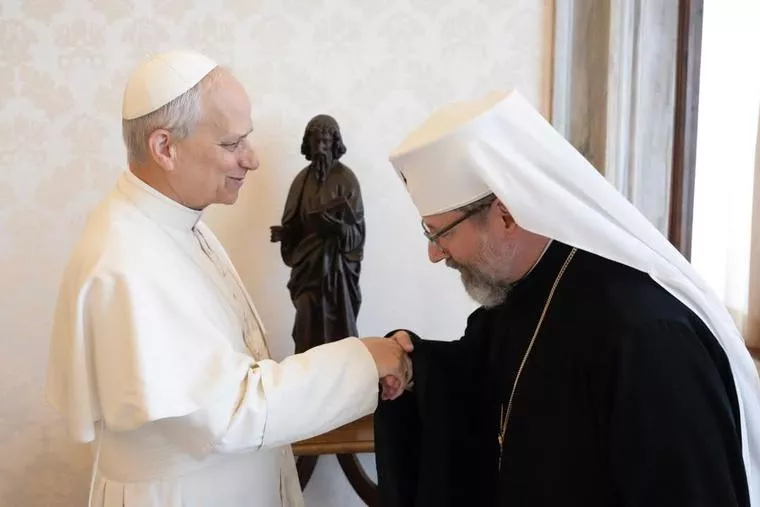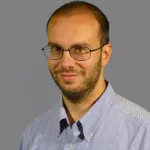
‘The Pope is the only one capable of protecting these people,’ Ukraine’s top Catholic leader tells Leo XIV in personal Vatican appeal.
Find the Pope's Biography here
In a private audience with Pope Leo XIV on May 16, Major Archbishop Sviatoslav Shevchuk, head of the Ukrainian Greek Catholic Church, invited the Pope to visit Ukraine to bring comfort to a people worn down by war.
“I told him we are relieved whenever the Pope speaks of us,” Archbishop Shevchuk said. “Facing a world that forgets about us — while there is a campaign denying our existence — the Pope allows us to be visible.”
Archbishop Shevchuk spoke with the Register in a 40-minute interview shortly after he met with the Holy Father. He reflected on the legacy of Pope Leo XIII, who emphasized the importance of the Eastern Churches, and discussed peace efforts as well as the prospects of a papal visit to Ukraine.
“It was important to have a personal meeting with the Pope,” Archbishop Shevchuk said. “News about Ukraine is mediated by other channels, and it was my duty to bring the people’s voice directly to the Pope. I had the impression that we have a great father. His fatherhood toward Ukraine may not make big news, but will sprout in many important decisions. I have the impression that there will be concrete actions.”
The major archbishop said he was able to give Leo XIV a glimpse of the life and work of the Church amid the war, and that the Holy Father “was very interested in hearing how the Church accompanies its people.” He emphasized the importance of what he called a “pastoral of mourning,” adding: “We are called to accompany people who suffer, who mourn the loss of those dearest to them.”
Archbishop Shevchuk observed that “every little attention that the Pope gives to the Ukrainian people, immediately turns into medicine,” pointing to the Regina Coeli address on May 11, when the Pope mentioned Ukraine and urged a lasting peace.
His words “were immediately received,” the archbishop said. “They represented a balm for our hearts. I explained to the Pope that the Ukrainian people, when they hear the Pope say that he carries the pain of Ukraine within himself, feel taken out of the darkness of suffering. Because we live in the face of those who say that we have no right to exist, who maintain that Ukraine does not exist and is an ideological invention.”
Now, the Ukrainian people are hoping for a papal visit. “I invited him, and I hope the right time will come,” said Archbishop Shevchuk. “I explained to the Holy Father that people are waiting for him and that this is the moment to act in a truly Christian way, in a way of the Church.”
He emphasized that acting in a Christian spirit means looking beyond politics. “We talk about Ukraine without considering the people, but only things. We heard about rare earths, territories, and economic interests in the negotiations. It is important, then, that the Church help to depoliticize this tragedy and bring out human faces and human rights also for the people who are in the occupied territories. The Pope is the only one capable of protecting these people.”
Looking at the situation in Ukraine, Archbishop Shevchuk said Ukrainians “have the hope of resisting,” but need to begin the peace process. “We have the feeling that the time has come for diplomacy, to find some negotiated way to stop this slaughter.”
He added that first, “we silence the weapons,” and then “we all sit around a table to discuss it together. This is the only alternative if we want to find something other than an armed encounter.”
He added, “We pray that this dialogue will be successful, but then Pope Leo himself reminded us in his speech to diplomats that this peace must always be a just peace based on truth, because a peace without justice is a negative peace, a peace that can sometimes be confused with a truce … a situation that carries within itself a spark of a future new conflict, because it does not extinguish the things of the conflict. But this spark of the fire of war is extinguished with justice.”
Archbishop Shevchuk emphasized the importance of Leo XIV’s insistence that peace must be rooted in religious freedom. “It is fundamental for us, who are even denied the right to exist. I hope peace agreements will also ensure human rights in the occupied territories. There, our Church has been ‘liquidated.’ We do not doubt that a Russian advancement could lead to the end of the space of religious freedom for our Church.”
However, Archbishop Shevchuk added, “Leo XIV also tied peace to the truth. Often, people want to separate peace from truth. Some have the illusion that everything can be finished in three or four hours. We risk considering this tragedy lightly without going to the bottom of it by talking about the truth.”
He also reflected on the legacy of Leo XIII, the last pope who took the name Leo before the current one.
Archbishop Shevchuk noted that Leo XIII issued the landmark 1894 encyclical Orientalium Dignitas, which challenged the prevailing practice of favoring the Latin rite over the Eastern rites. That rule was later abolished by the Second Vatican Council. “Leo XIII was a pope who truly considered the Eastern Churches to be on an equal footing with the Latin Churches,” Archbishop Shevchuk said. “This was reaffirmed by Leo XIV.”
Leo XIII also “began to re-establish the Eastern eparchies and create new ones,” Archbishop Shevchuk said. “He erected new eparchies in Ukraine and Galicia and appointed Sheptytsky as bishop,” he added, referring to the revered Metropolitan Andriy Sheptytsky, who led Ukrainian Catholics through two world wars and served for 44 years.
“Leo XIII did not deconstruct,” he continued. “He built according to pastoral needs. When Leo XIII became pope, the Ukrainian Greek Catholic Church had only three dioceses in Western Ukraine.”
“Today, we have 20 eparchies outside Ukraine and 16 inside Ukraine. And we need other structures — we need new structures, with organized parishes.”
Leo XIII also founded the Pontifical Ukrainian College in Rome. Archbishop Shevchuk said, “For us, Pope Leo XIII is the pope who supervised the formation and education of the clergy for the Eastern Catholic Churches, and this is always a look into the future.”
He added that the Ukrainian Greek Catholic Church hopes “Pope Leo XIV will also help us in these unusually difficult war conditions, to continue to worry about the formation of our clergy, because investing in education means transforming and giving hope. Pope Leo XIII was very concerned about the reconstruction of the seminary in Lviv. The Leonine imprint on our structures, especially in formation, is evident.”
“Leo XIII appointed Sheptytsky as bishop,” he said. “And we can say that Leo XIII and Sheptytsky gave face to our Church today.”
SIGN UP FOR OUR NEWSLETTER HERE
This article was originally published on National Catholic Register.

Andrea Gagliarducci is an Italian journalist for Catholic News Agency and Vatican analyst for ACI Stampa. He is a contributor to the National Catholic Register.








